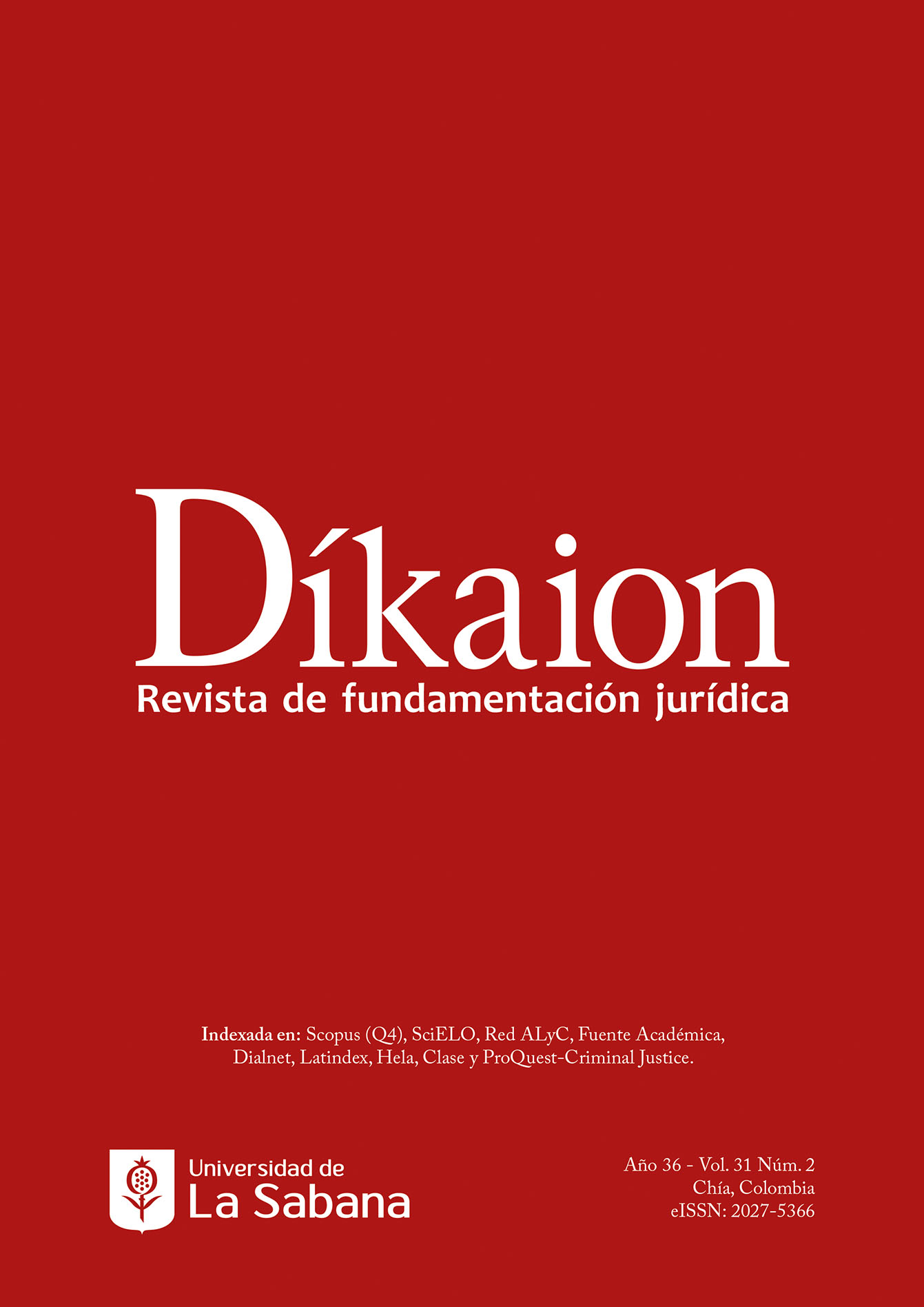The Natural and the Cultural in Man: Rousseau vs. Aristotle
DOI:
https://doi.org/10.5294/dika.2024.33.1.10Keywords:
Nature, Rousseau, environmentalism, natural law, transhumanism, gender perspective, AristotleAbstract
Environmental sensitivity has reinforced the classical Rousseauian antithesis between nature and culture, marginalising man to the point of contempt. On the other hand, the “gender perspective” and transhumanism, such as that of Israeli philosopher Yuval N. Harari with his Homo Deus, assume the existentialist approach of man as causa sui, a demiurge who designs his essence with all-embracing freedom. In this way, nature is dehumanized, and man is denaturalised, challenging the classical idea of nature as a motor and horizon of plenitude imprinted on beings, a tradition where man is not a being against, not even before nature, but the most natural being in the universe. After some introductory considerations, our exposition follows this order: firstly, we will make some conceptual clarifications on the meaning of the natural in man. Secondly, we will recall the Rousseauian vision of human nature, which we consider still dominant in Western culture. Thirdly, we will reflect on the naturally social dimension of human existence, and finally, we will present Aristotle’s reasons that refute entirely the Rousseauian idea that contrasts nature and culture, demonstrating that man as a cultural being is, at the same time, the most natural being in the universe.
Downloads
References
Álvarez, Andrés y Jimena Hurtado, “Jean-Jacques Rousseau y Karl Marx: estudio comparativo de dos críticas a la economía de mercado”, Revista de economía institucional X, 18, pp. 103-127.
Aristóteles, De Incessu Animalium, Madrid, Luarna, 2010.
Aristóteles, De Partibus Animalium, Madrid, Luarna, 2010.
Aristóteles, Ética a Nicómaco, Madrid, Gredos, 1985.
Aristóteles, Motu Animalium, Madrid, Luarna, 2010.
Aristóteles, Política, Madrid, Gredos, 1988.
Barrow, John D. y Frank J. Tipler, The Anthropic Cosmological Principle, Oxford, Oxford University Press, 1996.
Bolloré, Michel-Yves y Olivier Bonnassies, Dios - La ciencia - Las pruebas: el albor de una revolución, Madrid, Funambulista, 2023.
Brague, Rémi, Aristote et la question du monde, París, PUF, 1988.
Chappel, James, “The mythical connection between Natural Law and the Universal Declaration of Human Rights”, En AA. VV., The Cambridge Handbook of Natural Law and Human Rights, Cambridge, Cambridge University Press, 2022, pp. 88-99. https://doi.org/10.1017/9781108939225.008
Chávez Fernández, José, “La condición de persona como fundamento del derecho en la iusfilosofía de Javier Hervada”, Dikaion 19, 2, pp. 285-318.
Cruz Prados, Alfredo, Ethos y polis, Pamplona, Eunsa, 2006.
Cruz Prados, Alfredo, Sobre la realidad del derecho, Pamplona, Eunsa, 2021.
Currie, Janet y Erdal Tekin, Does Child Abuse Cause Crime?, National Bureau of Economic Research (NBER), 2006. https://doi.org/10.3386/w12171
De Aquino, Tomás, Compendio de Teología, Pamplona, Eunsa, 1980.
De Aquino, Tomás, Suma Teológica, Madrid, BAC Minor, 2001.
Elorduy, Carmelo, Tao Te Ching [1961], Madrid, Tecnos 2004.
Firestone, Sulamith, The Dialectic of sex: The Case for Feminist Revolution [1970], New York, William Morrow, 1970.
Hadjadj, Fabrice, “¡Por fin la naturaleza!, dijo ella”, Qué es la naturaleza, Madrid, Rialp, 2023.
Harari, Yuval Noah, Homo Deus: Breve historia del mañana, Madrid, Debate, 2016.
Hervada, Javier, Historia de la ciencia del derecho natural, Pamplona, Eunsa, 1987.
Hervada, Javier, Lecciones propedéuticas de filosofía del derecho, Pamplona, Eunsa, 1992.
Jensen, Steven J., Knowing the Natural Law, Washington D.C., The Catholic University of America Press, 2015.
Klein, Naomi, This Changes Everything: Capitalism vs. The Climate, New York, Simon & Schuster, 2014.
Magalhaes, Thiago, Fundamentos da Teoría Geral das Leis de Tomás de Aquino, Río de Janeiro, Lumen Juris, 2022.
Papa Benedicto XVI, Encíclica Caritas in veritate, Vatican, 29 de junio de 2009.
Papa Francisco, Encíclica Laudato si, Vatican, 24 de mayo de 2015.
Papa Juan Pablo II, Carta ap. Mulieris dignitatem, Vatican, 1988.
Pinckaers, Servais, Las fuentes de la moral cristiana [1985], Pamplona, Eunsa, 2000.
Ratzinger, Joseph, Dios y el mundo, Barcelona, Debolsillo, 2005.
Rousseau, Jean-Jacques, Discurso sobre el origen y los fundamentos de la desigualdad entre los hombres [1755], Madrid, Gredos, 2014-2015.
Rousseau, Jean-Jacques, Discurso sobre las ciencias y las artes [1750], Madrid, Gredos, 2014-2015.
Rousseau, Jean-Jacques, El contrato social [1762], Madrid, Gredos, 2014-2015.
Rousseau, Jean-Jacques, El Emilio o la educación [1762], Madrid, Gredos, 2014-2015.
Rousseau, Jean-Jacques, Escritos polémicos, Madrid, Tecnos, 2009.
Ruiz Retegui, Antonio, Pulchrum, Madrid, Rialp, 1999.
Varden, Erik, Castidad. La reconciliación de los sentidos, Madrid, Encuentro, 2023.
Wallace-Wells, David, The Uninhabitable Earth: Life After Warming, New York, Crown-Random House, 2019.
Downloads
Published
How to Cite
Issue
Section
License
Copyright (c) 2024 Diego Benedicto Poole

This work is licensed under a Creative Commons Attribution 4.0 International License.
1. Proposed Policy for Journals That Offer Open Access
Authors who publish with this journal agree to the following terms:
This journal and its papers are published with the Creative Commons License Attribution-NonCommercial-NoDerivatives 4.0 International (CC BY-NC-ND 4.0). You are free to share copy and redistribute the material in any medium or format if you: give appropriate credit, provide a link to the license, and indicate if changes were made; don’t use our material for commercial purposes; don’t remix, transform, or build upon the material.










